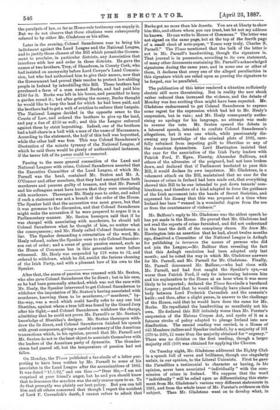The publication of this letter rendered a situation sufficiently electric
still more threatening. But in reality the new shock rather reduced than increased the violence, and the debate of Monday was less exciting than might have been expected. Mr. Gladstone endeavoured to get Colonel Saunderson to express some regret for the expression which had led to Mr. Healy's suspension, but in vain ; and Mr. Healy consequently autho- rising no apology for his language, no attempt was made to reverse the vote. Mr. Sexton opened the debate in a laboured speech, intended to confute Colonel Saunderson's allegations, but it was one which, while passionately dis- owning any knowledge of the criminal plots of 1882, care- fully refrained from imputing guilt to Sheridan or any of the American dynamiters. Lord Hartiugton insisted that the case for the association of the Irish Party leaders with Patrick Ford, P. Egan, Finerty, Alexander Sullivan, and others of the advocates of the poignard, had not been broken down, and declared that if Parliament hesitated to pass this Bill, it would declare its own impotence. Mr. Gladstone, in a vehement attack on the Bill, maintained that no case for the increase of crime in Ireland had been made out, that everything showed this Bill to be one intended to put down tenants' com- binations, and therefore of a kind adapted to force the guidance of the Irish movement into the hands of Secret Societies, and expressed his dismay that this was proposed at a time when Ireland has been "weaned in a wonderful degree from the use or from the countenance of violence."


































 Previous page
Previous page